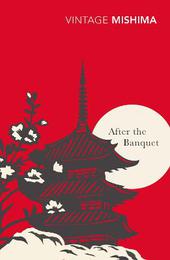
|
After the Banquet
Paperback / softback
Main Details
| Title |
After the Banquet
|
| Authors and Contributors |
By (author) Yukio Mishima
|
| Physical Properties |
| Format:Paperback / softback | | Pages:288 | | Dimensions(mm): Height 198,Width 129 |
|
| Category/Genre | Modern and contemporary fiction (post c 1945) |
|---|
| ISBN/Barcode |
9780099282785
|
| Classifications | Dewey:895.635 |
|---|
| Audience | |
|---|
|
Publishing Details |
| Publisher |
Vintage Publishing
|
| Imprint |
Vintage Classics
|
| Publication Date |
11 March 1999 |
| Publication Country |
United Kingdom
|
Description
An acute psychological portrait of a marriage where lofty traditions clash with appetite and ambition For years Kazu has run her fashionable restaurant with a combination of charm and shrewdness. But when the she falls in love with one of her clients, an aristocratic retired politician, she renounces her business in order to become his wife. But it is not so easy to renounce her independent spirit, and eventually Kazu must choose between her marriage and the demands of her irrepressible vitality. After the Banquet is a magnificent portrait of political and domestic warfare.
Author Biography
Yukio Mishima was born into a samurai family and imbued with the code of complete control over mind and body, and loyalty to the Emperor - the same code that produced the austerity and self-sacrifice of Zen. He wrote countless stories and thirty-three plays, in some of which he performed. Several films have been made from his novels, including The Sound of Waves, Enjo which was based on The Temple of the Golden Pavilion and The Sailor Who Fell From Grace with the Sea. Among his other works are the novels Confessions of a Mask and Thirst for Love and the short story collections Death in Midsummer and Acts of Worship. The Sea of Fertility tetralogy, however, is his masterpiece. After Mishima conceived the idea of The Sea of Fertility in 1964, he frequently said he would die when it was completed. On 25 November 1970, the day he completed The Decay of the Angel, the last novel of the cycle, Mishima committed seppuku (ritual suicide) at the age of forty-five.
ReviewsKazu is the biggest and most profound thing Mishima has done so far in an already distinguished career * New Yorker * His most novelistic work, with a degree of earthiness and warmth rare in his fiction * New York Times * Japan's foremost man of letters * Spectator * Direct yet allusive, poetic...an amazing feat * Atlantic *
|